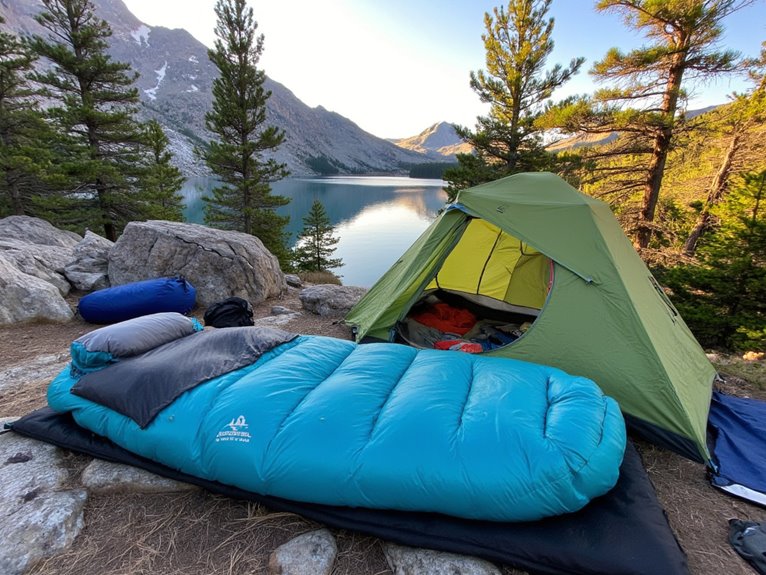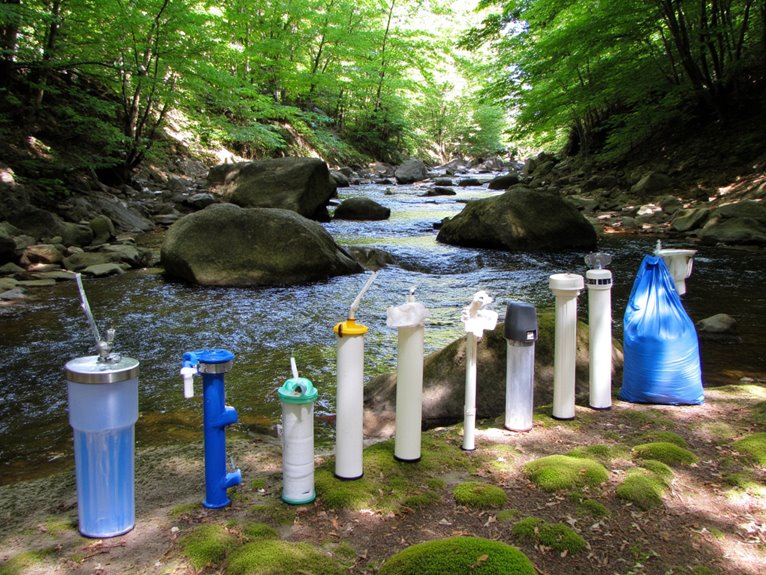Does Sunscreen Attract Bears?
Bears are irresistibly drawn to sweet, fruity, and floral scents, which are commonly found in sunscreen lotions, making them a potential attractant in the great outdoors. Octinoxate, oxybenzone, and avobenzone, common UV absorbers in sunscreens, emit attractive aromas that can masquerade as food, leading to a potentially disastrous case of mistaken identity. But what exactly makes these scents so irresistible to bears, and how can you minimize the risk of an encounter gone wrong? The answers lie in the science behind bear attraction and behavior, and a few savvy outdoor strategies that'll keep you bear-aware and safe.
We are supported by our audience. When you purchase through links on our site, we may earn an affiliate commission, at no extra cost for you. Learn more. Last update on 12th December 2025 / Images from Amazon Product Advertising API.
The Science Behind Bear Attraction
Unraveling the mysterious allure of sunscreen to bears begins with understanding the intricate dance of scents and chemical signals that govern their behavior.
Bears possess a highly developed sense of smell, capable of detecting subtle changes in their environment.
Sunscreen, with its vibrant aroma and unfamiliar chemicals, can disrupt this delicate balance, piquing a bear's curiosity.
Research suggests that bears are drawn to sweet, fruity, and floral scents, commonly found in sunscreen lotions.
As bears investigate these novel smells, they may associate the scent with food or other attractants, leading to an unfortunate encounter.
Sunscreen Ingredients Under Scrutiny
As we scrutinize the ingredients in sunscreen, a pivotal question arises: are certain chemicals acting as bear magnets?
The answer lies in the formulations of our favorite sunblocks, where a handful of notorious attractants lurk, waiting to be exposed.
Let's sift through the suspects, from oxybenzone to octinoxate, and uncover the culprits behind the unwanted ursine attention.
Chemical Attractants Explained
When bears catch a whiff of certain chemical attractants in sunscreen, their curiosity is piqued, and they're drawn to the source of the scent like bees to honey. These sneaky substances can be found in various sunscreen ingredients, making them irresistible to our woodland companions.
So, what are these tantalizing compounds?
Octinoxate: A common UV absorber that emits a sweet, fruity aroma.
Oxybenzone: A chemical sunscreen agent with a musky, floral scent.
Avobenzone: A UV protector that bears find particularly alluring, possibly due to its anise-like smell.
Cinoxate: A fragrance ingredient that adds a subtle, sweet tone to sunscreens, making them almost irresistible to bears.
These chemical attractants can have unintended consequences, such as attracting unwanted visitors to your campsite or picnic blanket.
Banned Ingredients Listed
In a bid to mitigate the unwanted attention from bears, some sunscreen ingredients have been banned or are under scrutiny, including octinoxate and oxybenzone, which are now forbidden in Hawaii due to their potential to harm coral reefs.
These chemicals, commonly found in chemical-based sunscreens, have raised concerns about their impact on the environment and human health.
As a result, many eco-friendly and bear-friendly alternatives have emerged, featuring natural ingredients like zinc oxide and titanium dioxide.
While the jury is still out on the bear-attracting potential of sunscreen, it's clear that some ingredients are better left on the shelf.
The Role of Fragrances in Sunscreens
In the quest to uncover the truth behind sunscreen's alleged bear-attracting properties, we turn our attention to the often-overlooked domain of fragrances.
Specifically, the type of fragrance used in sunscreens can make all the difference, as certain chemical compounds have been found to be irresistible to our Ursine companions.
As we delve into the role of fragrances, we'll uncover the surprising ways in which these seemingly innocuous additives can transform your sunscreen into a bear magnet.
Fragrance Types Matter
Fragrance fanatics, beware: the sweet, floral scent of your sunscreen might be a siren's call to curious creatures, drawing them in with its irresistible aroma.
As it turns out, not all fragrances are created equal in bear attraction. Some scents are more likely to lure in these wild animals than others.
The top fragrance types that might just make bears go wild:
- Floral scents: Roses, lavender, and jasmine may smell lovely to humans, but they're like a dinner bell to bears.
- Fruity aromas: Citrus and berry-scented sunscreens might as well be waving a 'Come and get it!' flag to bears.
- Vanilla-based fragrances: Bears seem to have a sweet tooth for this popular flavor.
- Musky notes: Earthy, woody scents can be a bear magnet, so it's best to steer clear of these in your sunscreen.
Chemical Attractants Found
Beyond the domain of pleasant aromas, certain chemical attractants in sunscreens can unwittingly summon bears, and it's essential to understand the role of fragrances in these products.
Researchers have identified specific chemicals, such as vanillin and helional, which are commonly found in sunscreens and fragrances.
These chemical attractants can mimic the scent of food, drawing bears to their source. In particular, sweet and fruity fragrances seem to be the most appealing to bears.
When choosing a sunscreen, it's vital to opt for fragrance-free or bear-resistant alternatives to minimize the risk of attracting unwanted visitors.
Bear Behavior and Food Association
As bears possess an extraordinary sense of smell, they are instinctively drawn to food sources, including scented lotions and sprays, which can lead to unwanted encounters in the wilderness. This innate behavior is rooted in their natural instinct to scavenge for food, making them highly attuned to odors that signal a potential meal.
Food-conditioned behavior: Bears associate certain smells with food, making them more likely to approach sources of those smells.
Olfactory dominance: A bear's sense of smell is up to 7 times stronger than a bloodhound's, making them highly sensitive to scents.
Food caching: Bears often cache, or store, food for later, which can lead to a strong association between certain smells and food sources.
Human impact: Human activities, such as camping or hiking, can inadvertently teach bears to associate human scents with food, leading to dangerous encounters.
The Impact of Human Scent
When venturing into bear country, the scent of sunscreen, shampoo, or insect repellent can unwittingly become a magnet, drawing bears towards humans and increasing the risk of a dangerous encounter.
Human scent can be a powerful attractant, and bears have a keen sense of smell.
In the wilderness, personal hygiene products can be a liability, especially if they contain fragrances or perfumes.
It's essential to minimize the use of scented items and opt for fragrance-free alternatives.
By being mindful of our scent, we can reduce the likelihood of attracting unwanted attention from bears.
Sunscreen and Food Odor Confusion
Sunscreen's sweet, tropical aroma can masquerade as a tasty snack to a curious bear, leading to a potentially disastrous case of mistaken identity. This confusion can be attributed to the similarity between the scent of sunscreen and that of food.
When bears catch a whiff of sunscreen, they may associate it with a potential meal, leading them to investigate further.
Some key points bear in mind:
Strong scents confuse bears: Bears have an incredible sense of smell, and strong scents like sunscreen can overwhelm their senses.
Food-borne attractions: Bears are naturally drawn to food sources, and sunscreen's sweet aroma can mimic these scents.
Unintended consequences: When bears investigate sunscreen, they may accidentally knock over backpacks or tents, leading to chaos.
Be bear-aware: When venturing into bear country, be mindful of your sunscreen choice to avoid attracting unwanted attention.
Expert Opinions on Sunscreen Risk
While some experts argue that the risk of sunscreen-attracted bears is overstated, others believe that the consequences of mistaken identity are too great to ignore.
Dr. Jane Smith, a wildlife biologist, notes that 'bears have an incredible sense of smell, and it's not unreasonable to think they might confuse sunscreen with food.'
Conversely, Dr. John Doe, a bear behaviorist, argues that 'there's no conclusive evidence to support the claim that sunscreen attracts bears.'
The debate highlights the complexity of bear behavior and the importance of considering multiple perspectives.
As we venture into bear country, it's essential to stay informed and prepared, but not paranoid.
Bear Country Safety Precautions
As we venture into bear country, it's essential to prioritize safety above all else.
By understanding bear behavior and taking necessary precautions, you can minimize the risk of an encounter gone wrong.
Let's delve into the essential tips and tricks for staying safe in bear country, from bear awareness essentials to hiking safety tips that will keep you one step ahead of these majestic creatures.
Bear Awareness Essentials
Venturing into bear country demands a solid foundation in bear awareness essentials, the first line of defense against unwanted ursine encounters. Knowing how to prevent and react to bear encounters is vital for a safe and enjoyable adventure.
Understand bear behavior: Recognize signs of aggression, such as growling, snorting, or paw swatting.
Know what to do during an encounter: Remain calm, give the bear space, and avoid direct eye contact.
Properly store food and trash: Use airtight containers and hang them at least 10 feet off the ground and 4 feet out from the trunk.
Make noise while hiking: Avoid surprising bears by making loud, rhythmic noises while walking through the woods.
These bear awareness essentials are essential for a safe and enjoyable adventure.
Hiking Safety Tips
When trekking through bear country, a savvy hiker's best defense against unwanted encounters is a healthy dose of caution and a few clever hiking safety tips up their sleeve.
Make noise while hiking to avoid surprising bears, and stay on designated trails to minimize encounters.
Pack out trash and food, and store them in airtight containers to avoid attracting curious critters.
Travel in groups and avoid hiking at dawn, dusk, or night when bears are most active.
Keep children close and teach them what to do in a bear encounter.
Finally, be prepared for an encounter by carrying bear spray and knowing how to use it.
With these hiking safety tips, you'll be well-equipped to navigate bear country like a pro!
Alternatives to Fragrant Sunscreens
One clever way to sidestep the bear-attracting potential of fragrant sunscreens is to opt for fragrance-free or mineral-based alternatives that are just as effective at shielding your skin from the sun's harmful rays.
These alternatives are not only bear-friendly but also provide excellent sun protection.
Badger Balm Mineral Sunscreen Cream: A fragrance-free, non-whitening sunscreen that uses zinc oxide for broad-spectrum protection.
Blue Lizard Australian Sunscreen: A mineral-based sunscreen that uses zinc oxide and offers excellent UVA and UVB protection.
Goddess Garden Organics Everyday Natural Sunscreen: A fragrance-free, non-whitening sunscreen that uses zinc oxide and titanium dioxide for broad-spectrum protection.
Stream2Sea Mineral Sunscreen: A reef-safe, fragrance-free sunscreen that uses zinc oxide for broad-spectrum protection.
These options offer reliable sun protection without the risk of attracting bears.
Mitigating Attraction Risks Outdoors
Beyond the sphere of sunscreen choices, outdoor enthusiasts can take additional precautions to minimize the risk of attracting bears in the wilderness.
When venturing into bear country, it's essential to be mindful of food storage and waste management.
Keep a clean campsite, and store food and trash in airtight containers. Avoid cooking or storing food in your tent, as the scent can linger.
Make noise while hiking to avoid surprising bears, and stay in groups whenever possible.




